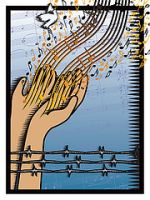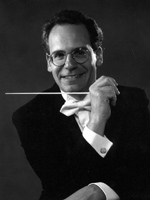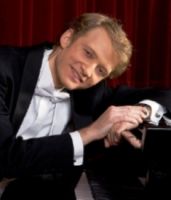
Poster image for "A Musical Legacy: Three Works from Three Centuries and Two Continents," Plum Street Temple, Cincinnati, January 27, 2010
|
A reconciliation in music.
Coincident with United Nations Holocaust Remembrance Day (held each year on January 27, anniversary of the liberation of Auschwitz in 1945) it was an event well matched to Cincinnati, a city rich in Jewish and German traditions and sister city of Munich, Germany.
Presented by the Center for Holocaust and Humanity Education in partnership with the University of Cincinnati College-Conservatory of Music, the concert spanned three centuries, with works by Jewish composers Hermann Levi (1839-1900) and Walter Braunfels (1882-1954) and non-Jewish American composer Thomas Pasatieri, who wrote a cantata in 2003 on texts by Polish Holocaust victim Pola Braun.

Mark Gibson
|

Martin Wettges
|
Levi, Braunfels and Braun represented voices stilled during the Nazi era, when simply having Jewish blood was fatal to over six million people. Braun, a Polish cabaret singer, died at Majdanek concentration camp, where she was taken from the Warsaw ghetto.
Heard on the gripping program were Pasatieri's "Letter to Warsaw," Levi's Six Songs, Op. 2, orchestrated by Wettges (a world premiere), and Braunfels' 1948 Sinfonia Concertante for Violin, Viola and Two Horns, Op. 68 (a U.S. premiere). Wettges un-earthed the Levi and Braunfels works during researches in his native country, and was encouraged by Gibson to perform them in Cincinnati.
The music was put in historical context and given added poignancy by narrator Mitchell Livingston, vice president for student affairs at U.C. and a member of the CHHE executive committee.
Levi was the son of a rabbi and one of the leading conductors of his day. He was a friend of both Brahms and Wagner and led the premiere of Anton Bruckner's Symphony No. 7, Bruckner's first great success. (Those who attended the performance of Bruckner's Eighth Symphony by music director Paavo Järvi and the Cincinnati Symphony Orchestra's Jan. 22 and 23 at Music Hall may remember that Levi was Bruckner's first choice to introduce it, too, but Levi declined, leading the composer to extensively revise it.)
Wagner, whose music became entwined with Hitler's murderous regime, chose Levi to premiere his opera "Parsifal" at Bayreuth, where the Jewish conductor had a virtually exclusive franchise until he retired in 1894.
Braunfels, a composer and pianist, co-founded and headed the Hochschule für Musik in Cologne until forced to leave in 1933 because he was half-Jewish. His music, formerly well received, was banned, but he managed to hide out until after the war, when he returned to his post in Cologne. Cincinnati May Festival music director James Conlon, a champion of composers eclipsed during the Holocaust, led Braunfels' 1920 opera "Die Vögel" ("The Birds") as part of his "Recovered Voices" project at Los Angeles Opera in April, 2009.

Plum Street (Isaac M. Wise) Temple, Cincinnati, Ohio
|

Interior of Plum Street Temple, Cincinnati, Ohio
|
The music was extremely rewarding and served as a reminder of the richness effaced during the Nazi era. Twentieth-century music became fully "modern" following World War II (a deliberate retreat from German romanticism), so music such as Levi's and Braunfels' went out of style. It was as if the train had pulled out of the station, leaving them behind forever.
Efforts such as Wettges' have special significance because of his non-Jewish German heritage (his grandfather fought for the Third Reich). The program was introduced by Richard Schade, U.C. professor of German, and honorary consul of the Federal Republic of Germany.
Levi's songs, not heard since his death, were delightful. Each is a small, melodic gem, brief and brimming with melody a la Schubert and Schumann. His texts include poems by Heinrich Heine, whose longing "Allnnächtlich im Träume" ("Nightly in my dreams I see you") was also set by Schumann. Besides love, his subjects are the sea, the forest, war, even the notorious Rhine gold of the Niebelungs (think Wagner's "Ring" cycle).
Beck's ringing lyric tenor lent itself well to the music. Wettges' vivid, romantic orchestration enhanced Levi's tone painting, which evoked marching feet, mermaids singing, bells ringing and the forbidding tone of treasure hidden in the Rhine (and the heart). (This listener enjoyed the double bass fillip that ended the poem about a fallen star that lets the world in on a pair of nocturnal lovers.)
Braunfels' Sinfonia Concertante was more complex, being cast in a more expressionistic, late romantic style. The CCM soloists, accompanied by a chamber ensemble and led by Wettges, handled it with remarkable commitment and skill. It is a substantial work in four movements, with challenging, often high-lying passages for the strings and soaring moments for the horns. The opening Adagio was filled with passion and featured gorgeous interplay between the violin and viola. The second movement, Lebhaft ("Lively") had a sprightly edge, while the third (Adagio) came to a soft, peaceful end. Ulrich and De Stefano put considerable muscle into the Allegro di molto, which brought the work to a vigorous, upbeat end.
Soprano Giaquinto gave nobility and pathos to Pasatieri's "Letter to Warsaw" (premiered in 2004 by soprano Jane Eaglen with Gerard Schwarz and the Seattle Symphony). The five movements, written in a through-composed, declamatory style recalling Benjamin Britten, are heart-wrenching, from the opening "Jew" to the final "Kaddish." Gibson led the Philharmonia in a performance that grabbed the audience and never let it go.
"Tell me, dear mama, what does the word 'Jew' mean?" sang Giaquinto plaintively in "Jew." Stabbing rhythms in the orchestra colored her final answer: a "person who knows truly bitter tears." Tsurik a heym ("You do not know Yiddish, Madam") came to a harmonically ambiguous end, while "Mother" explored the myriad of feelings of women when they hear a child cry "Mama" and how mothers could stem the tide of cruelty in the world.
Two songs are based on poems Braun wrote in the Majdanek concentration camp. "Letter to Warsaw" recalls the streets of her "loving hometown" in march-like rhythms echoing the din of battle. There was both hope and despair in "An Ordinary Day -- Moving Day," a day which may lead "to freedom or to the gas." "Kaddish" was a gentle prayer for peace.
CCM's Harmony Fund: Challenging Hate and Prejudice Through Performing Arts was the lead sponsor for the concert. Presenting partners were with the American Jewish Committee, Consul General of the Federal Republic of Germay, Jewish Community Relations Council of Cincinnati and Munich Sister City Association of Greater Cincinnati.